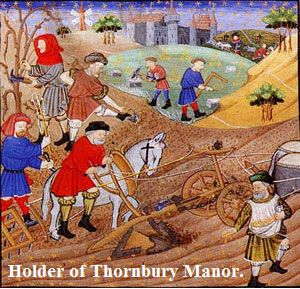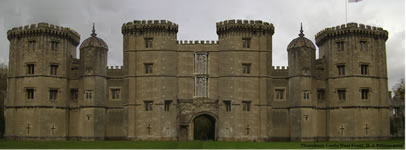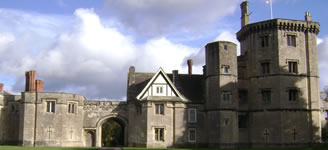|
|
| 1027-1083 |
 |
| The manor: Brictric was a Saxon theign and inherited the manor of Thornbury from his father Algar and held it between 1062-70. |
| Notes about Brictric: Beorhtric is the original Anglo-Saxon spelling translated to Bethric or Brictric. He was a very wealthy Anglo-Saxon and held manors in several different counties in the Westcountry along with other manors elsewhere in England. His landholdings in Devon are listed in the Domesday Book. The manor was seized by the crown after 1066. |
| Posts held: Ambassador at the court of Count Baldwin, Flanders. |
| Residence: He lived at Hanley Worcestershire. |
| His downfall! He spurned the affections of Matilda who later became wife of William the Conqueror. She had Brictric imprisoned in Winchester where he died. |
| Father Aelfgar. |
| Mother Aelfgifu. |
| Further information: Read more about Brictric on the Internet. |
| Some key information about Brictric from translated sources: The transcipt below has two key points: 1) He may have been a grandson or great grandson of Haylward. The time line is too long for his father Algar to be a son of Haylward, unless Haylward son was Algar (I) and Algar's son was also Algar (II). 2) Brictric held Turnburie the original spelling of Thornbury. |
| Leland’s Latin account rendered into English, is as follows. “Brictric, when embassador in Normandy, refused the marriage of Matildis, who afterward wife of William the Conqueror. Brictric, lord of Glocester, was taken in his manor of Hanley, and carried to Winchester, where he died without children. On his death queen Matilda received the Honour of Glocester. She died A’D’ 1083 in the month of April, and then the King reserved himself that Honour.” Leland’s own English account is thus. “After, (h) in the latter reign of the Danes and Edward (i) the Confessor, was AEilwerdus Meaw, Erle of Glocester, and he was counted as founder of Cranburne. AEilwerdus had a (k) son (a grandson or great grandson) called Brictrice, earl of Glocester about the time of the coming of Duke William of Normandie into England. Matildis, wife to William Conqueror, asked Brictice in gift, of her husband; and having him, put in the castle of Hanley beside Sarisbyri, and there he died. Some say, that Matildis would have had him, afore duke William, to her husband; but refusing it, had after hard favour at her hands. King William gave the preferment of the county of Glocester unto his wife Matilda.” Brictric’s possessions were very great, as enumerated in Domesday book. The name frequently occurs in that Record, and therefore I insert only those lands which either certainly or almost certainly belonged to Algar, “These Manors in Dorste were possessed by Brictric in the time of Edward the Confessor, and afterwards by queen Matildis;” (l) Devrel, Litelfrome, (m) Creneburne. He possessed also Wimborne in Dorset; and Winescombe in Somerset, which last held of the Abbey of Glastonbury, from which he also held the church of St Andrew in Givilchestre: and he had psosessions in Curry in Somerset. The following lands in Devon Brictric held, and after him queen Mathildis held them: Levia, Halgewelle, Clovelie, Bedeforde, and a fishery adjoining to this manor, Liteham, Langtrev, Edeslege, Wincheleie, Aisse, Slapeford, Bichentone, Morchet, Holcombe, Halsbreton, and Aisbertone. These fifteen estates, most if not all which were manors, were part of Brictic’s great estates, seized by queen Matilda on his imprisonment. He also held Sanforde in Devon, which the Queen gave to Roger de Busli with his wife; and Mochelsberie in Devon. The four following Manors in Cornwall belonged also to Brictric and afterwards possessed by queen Mathildis; Conarditone, Guildford, Bennertone, and Melledham: he also possessed a manor in Cornwall called Carewrge. But Gloucestershire was the county, where his possessions chiefly lay, all which at the time of the Domesday Survey belonged to to the King, and the greater part had previously been possessed by Queen Matilda. The manor of Tewkesbury with it’s great dependencies was the chief; with Hanley, Turnburie, Sopebury, Aveninge, Fareford etc etc; to reckon up and appreciate all which, would require a separate treatise, and not a short one. |
|
|
|
|
|
|
1 Edward the Confessor
|
|
2 Harold II
|
|
3 William I
|
|
|
|
|





































